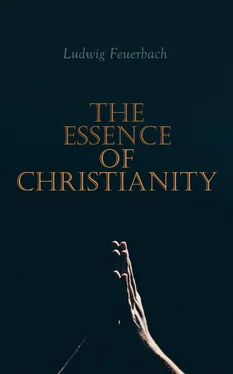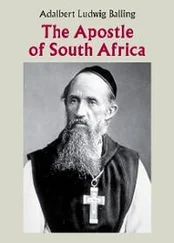1.“Such descriptions as those in which the Scriptures speak of God as of a man, and ascribe to him all that is human, are very sweet and comforting—namely, that he talks with us as a friend, and of such things as men are wont to talk of with each other; that he rejoices, sorrows, and suffers, like a man, for the sake of the mystery of the future humanity of Christ.”—Luther (Th. ii. p. 334).
2.“Deus homo factus est, ut homo Deus fieret.”—Augustinus (Serm. ad Pop. p. 371, c. 1). In Luther, however (Th. i. p. 334), there is a passage which indicates the true relation. When Moses called man “the image of God, the likeness of God,” he meant, says Luther, obscurely to intimate that “God was to become man.” Thus here the incarnation of God is clearly enough represented as a consequence of the deification of man.
3.It was in this sense that the old uncompromising enthusiastic faith celebrated the Incarnation. “Amor triumphat de Deo,” says St. Bernard. And only in the sense of a real self-renunciation, self-negation of the Godhead, lies the reality, the vis of the Incarnation; although this self-negation is in itself merely a conception of the imagination, for, looked at in broad daylight, God does not negative himself in the Incarnation, but he shows himself as that which he is, as a human being. The fabrications which modern rationalistic orthodoxy and pietistic rationalism have advanced concerning the Incarnation, in opposition to the rapturous conceptions and expressions of ancient faith, do not deserve to be mentioned, still less controverted.
4.“Nos scimus affici Deum misericordia nostri et non solum respicere lacrymas nostras, sed etiam numerare stillulas, sicut scriptum in Psalmo LVI. Filius Dei vere afficitur sensu miseriarum nostrarum.”—Melancthonis et aliorum (Declam. Th. iii. p. 286, p. 450).
5.St. Bernard resorts to a charmingly sophistical play of words:—” Impassibilis est Deus, sed non incompassibilis , cui proprium est misereri semper et parcere.”—(Sup. Cant. Sermo 26.) As if compassion were not suffering—the suffering of love, it is true, the suffering of the heart. But what does suffer if not thy sympathising heart? No love, no suffering. The material, the source of suffering, is the universal heart, the common bond of all beings.
CHAPTER V.
THE MYSTERY OF THE SUFFERING GOD.
Table of Contents
An essential condition of the incarnate, or, what is the same thing, the human God, namely, Christ, is the Passion. Love attests itself by suffering. All thoughts and feelings which are immediately associated with Christ concentrate themselves in the idea of the Passion. God as God is the sum of all human perfection; God as Christ is the sum of all human misery. The heathen philosophers celebrated activity, especially the spontaneous activity of the intelligence, as the highest, the divine; the Christians consecrated passivity, even placing it in God. If God as actus purus , as pure activity, is the God of abstract philosophy; so, on the other hand, Christ, the God of the Christians, is the passio pura , pure suffering—the highest metaphysical thought, the être suprême of the heart. For what makes more impression on the heart than suffering? especially the suffering of one who considered in himself is free from suffering, exalted above it;—the suffering of the innocent, endured purely for the good of others, the suffering of love,—self-sacrifice? But for the very reason that the history of the Passion is the history which most deeply affects the human heart, or let us rather say the heart in general—for it would be a ludicrous mistake in man to attempt to conceive any other heart than the human,—it follows undeniably that nothing else is expressed in that history, nothing else is made an object in it, but the nature of the heart,—that it is not an invention of the understanding or the poetic faculty, but of the heart. The heart, however, does not invent in the same way as the free imagination or intelligence; it has a passive, receptive relation to what it produces; all that proceeds from it seems to it given from without, takes it by violence, works with the force of irresistible necessity. The heart overcomes, masters man; he who is once in its power is possessed as it were by his demon, by his God. The heart knows no other God, no more excellent being than itself, than a God whose name may indeed be another, but whose nature, whose substance is the nature of the heart. And out of the heart, out of the inward impulse to do good, to live and die for man, out of the divine instinct of benevolence which desires to make all happy, and excludes none, not even the most abandoned and abject, out of the moral duty of benevolence in the highest sense, as having become an inward necessity, i.e. , a movement of the heart,—out of the human nature, therefore, as it reveals itself through the heart, has sprung what is best, what is true in Christianity—its essence purified from theological dogmas and contradictions.
For, according to the principles which we have already developed, that which in religion is the predicate we must make the subject, and that which in religion is a subject we must make a predicate, thus inverting the oracles of religion; and by this means we arrive at the truth. God suffers—suffering is the predicate—but for men, for others, not for himself. What does that mean in plain speech? Nothing else than this: to suffer for others is divine; he who suffers for others, who lays down his life for them, acts divinely, is a God to men. 1
The Passion of Christ, however, represents not only moral, voluntary suffering, the suffering of love, the power of sacrificing self for the good of others; it represents also suffering as such, suffering in so far as it is an expression of passibility in general. The Christian religion is so little superhuman that it even sanctions human weakness. The heathen philosopher, on hearing tidings of the death of his child exclaims: “I knew that he was mortal.” Christ, on the contrary,—at least in the Bible,—sheds tears over the death of Lazarus, a death which he nevertheless knew to be only an apparent one. While Socrates empties the cup of poison with unshaken soul, Christ exclaims, “If it be possible, let this cup pass from me.” 2Christ is in this respect the self-confession of human sensibility. In opposition to the heathen, and in particular the stoical principle, with its rigorous energy of will and self-sustainedness, the Christian involves the consciousness of his own sensitiveness and susceptibility in the consciousness of God; he finds it, if only it be no sinful weakness, not denied, not condemned in God.
To suffer is the highest command of Christianity—the history of Christianity is the history of the Passion of Humanity. While amongst the heathens the shout of sensual pleasure mingled itself in the worship of the gods, amongst the Christians, we mean of course the ancient Christians, God is served with sighs and tears. 3But as where sounds of sensual pleasure make a part of the cultus, it is a sensual God, a God of life, who is worshipped, as indeed these shouts of joy are only a symbolical definition of the nature of the gods to whom this jubilation is acceptable; so also the sighs of Christians are tones which proceed from the inmost soul, the inmost nature of their God. The God expressed by the cultus, whether this be an external, or, as with the Christians, an inward spiritual worship,—not the God of sophistical theology,—is the true God of man. But the Christians, we mean of course the ancient Christians, believed that they rendered the highest honour to their God by tears, the tears of repentance and yearning. Thus tears are the light-reflecting drops which mirror the nature of the Christian’s God. But a God who has pleasure in tears, expresses nothing else than the nature of the heart. It is true that the theory of the Christian religion says: Christ has done all for us, has redeemed us, has reconciled us with God; and from hence the inference may be drawn: Let us be of a joyful mind and disposition; what need have we to trouble ourselves as to how we shall reconcile ourselves with God? we are reconciled already. But the imperfect tense in which the fact of suffering is expressed makes a deeper, a more enduring impression, than the perfect tense which expresses the fact of redemption. The redemption is only the result of the suffering; the suffering is the cause of the redemption. Hence the suffering takes deeper root in the feelings; the suffering makes itself an object of imitation;—not so the redemption. If God himself suffered for my sake, how can I be joyful, how can I allow myself any gladness, at least on this corrupt earth, which was the theatre of his suffering? 4Ought I to fare better than God? Ought I not, then, to make his sufferings my own? Is not what God my Lord does my model? Or shall I share only the gain and not the cost also? Do I know merely that he has redeemed me? Do I not also know the history of his suffering? Should it be an object of cold remembrance to me, or even an object of rejoicing, because it has purchased my salvation? Who can think so—who can wish to be exempt from the sufferings of his God?
Читать дальше












